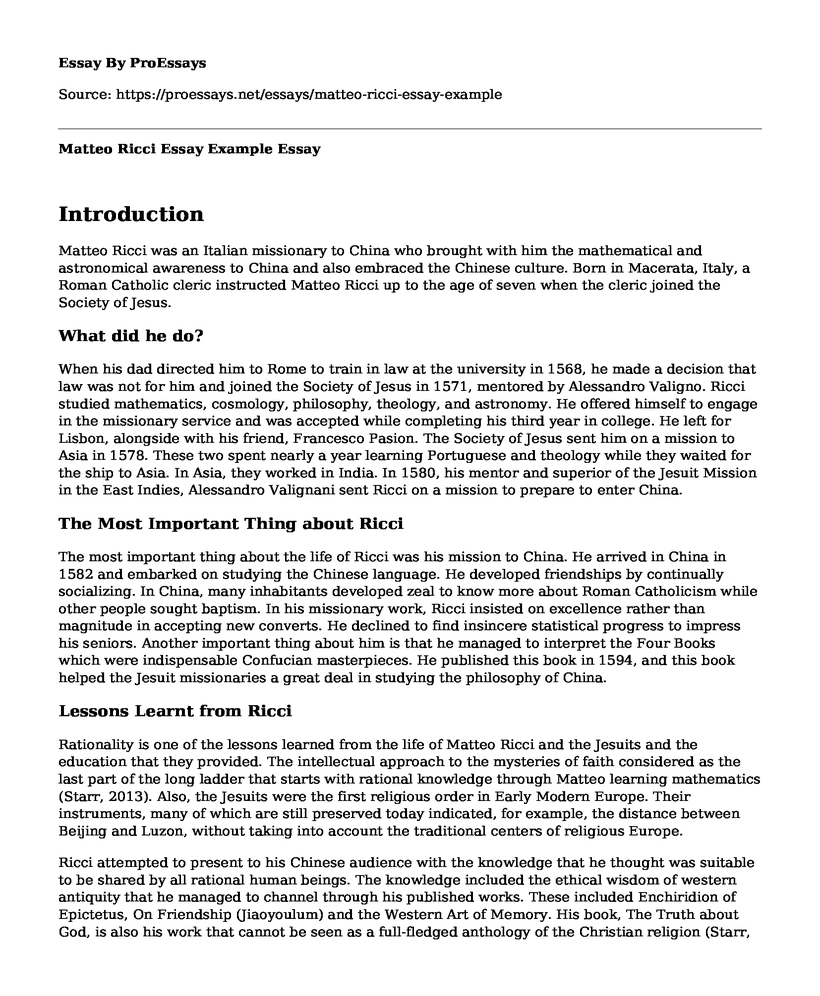Introduction
Matteo Ricci was an Italian missionary to China who brought with him the mathematical and astronomical awareness to China and also embraced the Chinese culture. Born in Macerata, Italy, a Roman Catholic cleric instructed Matteo Ricci up to the age of seven when the cleric joined the Society of Jesus.
What did he do?
When his dad directed him to Rome to train in law at the university in 1568, he made a decision that law was not for him and joined the Society of Jesus in 1571, mentored by Alessandro Valigno. Ricci studied mathematics, cosmology, philosophy, theology, and astronomy. He offered himself to engage in the missionary service and was accepted while completing his third year in college. He left for Lisbon, alongside with his friend, Francesco Pasion. The Society of Jesus sent him on a mission to Asia in 1578. These two spent nearly a year learning Portuguese and theology while they waited for the ship to Asia. In Asia, they worked in India. In 1580, his mentor and superior of the Jesuit Mission in the East Indies, Alessandro Valignani sent Ricci on a mission to prepare to enter China.
The Most Important Thing about Ricci
The most important thing about the life of Ricci was his mission to China. He arrived in China in 1582 and embarked on studying the Chinese language. He developed friendships by continually socializing. In China, many inhabitants developed zeal to know more about Roman Catholicism while other people sought baptism. In his missionary work, Ricci insisted on excellence rather than magnitude in accepting new converts. He declined to find insincere statistical progress to impress his seniors. Another important thing about him is that he managed to interpret the Four Books which were indispensable Confucian masterpieces. He published this book in 1594, and this book helped the Jesuit missionaries a great deal in studying the philosophy of China.
Lessons Learnt from Ricci
Rationality is one of the lessons learned from the life of Matteo Ricci and the Jesuits and the education that they provided. The intellectual approach to the mysteries of faith considered as the last part of the long ladder that starts with rational knowledge through Matteo learning mathematics (Starr, 2013). Also, the Jesuits were the first religious order in Early Modern Europe. Their instruments, many of which are still preserved today indicated, for example, the distance between Beijing and Luzon, without taking into account the traditional centers of religious Europe.
Ricci attempted to present to his Chinese audience with the knowledge that he thought was suitable to be shared by all rational human beings. The knowledge included the ethical wisdom of western antiquity that he managed to channel through his published works. These included Enchiridion of Epictetus, On Friendship (Jiaoyoulum) and the Western Art of Memory. His book, The Truth about God, is also his work that cannot be seen as a full-fledged anthology of the Christian religion (Starr, 2013). These publications made outburst contribution to the Christian theology and the missionary work.
Ricci held a belief that reason was a characteristic that characterized the Chinese culture. When he entered China with his counterpart, Alessandro Valignano, the two overwhelmingly managed to draw a positive culture of China that was different from the western perception. China became to be known as the motherland of reason, and some Chinese citizens converted to Christianity.
According to Starr (2013), Matteo Ricci was also a pioneer who made two civilizations to be accessible to each other. These two civilizations were the Chinese and European civilizations. He managed this by committing himself to understand the Chinese culture, beginning with the Chinese language. He managed to search for the ideas that the Chinese shared with the West. However, the later generations of westerners, diplomats, missionaries, and traders have departed from this approach and emphasized on the need for differences between China and the West.
Reference
Starr, C. (2013). A Jesuit in the Forbidden City: Matteo Ricci, 1552-1610. International Bulletin of Mission Research, 37(1), 56.
Cite this page
Matteo Ricci Essay Example. (2022, Jun 19). Retrieved from https://proessays.net/essays/matteo-ricci-essay-example
If you are the original author of this essay and no longer wish to have it published on the ProEssays website, please click below to request its removal:
- Similarity of Sor Juana Ines de la Cruz and Leonardo Da Vinci Paper Example
- Family Migration Experience Essay Example
- Essay Sample on Jewish Museum, Camden: Preserving Jewish Heritage & East End History
- Exodus: From Slavery to Freedom Through Moses' Courage - Essay Sample
- Embracing Diversity: A Must For Success in Business Today - Essay Sample
- Native Americans & US Federal Govt: War, Opp., Defeat. Essay
- Paper Sample on Thomas Graham: Pioneer in Chemistry and the Father of Diffusion Studies







